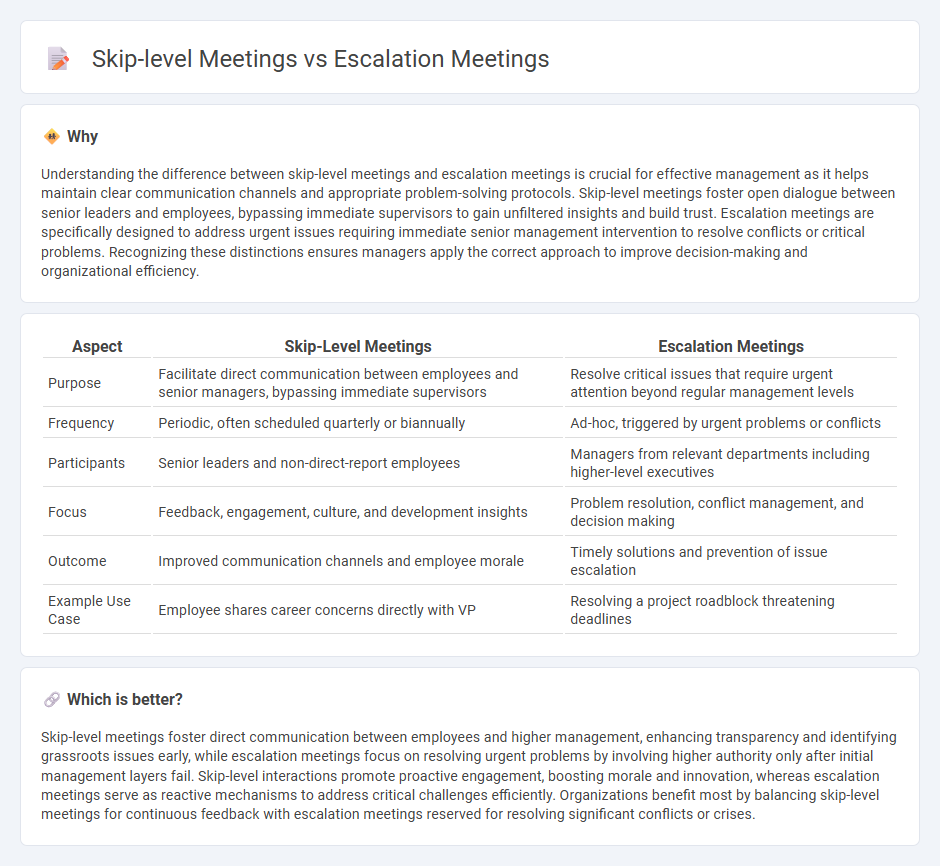
Skip-level meetings foster direct communication between senior leaders and employees beyond immediate supervisors, enhancing transparency and employee engagement. Escalation meetings focus on resolving urgent issues by involving higher management to address problems that frontline teams cannot solve independently. Explore how both meeting types improve organizational effectiveness through targeted communication strategies.
Why it is important
Understanding the difference between skip-level meetings and escalation meetings is crucial for effective management as it helps maintain clear communication channels and appropriate problem-solving protocols. Skip-level meetings foster open dialogue between senior leaders and employees, bypassing immediate supervisors to gain unfiltered insights and build trust. Escalation meetings are specifically designed to address urgent issues requiring immediate senior management intervention to resolve conflicts or critical problems. Recognizing these distinctions ensures managers apply the correct approach to improve decision-making and organizational efficiency.
Comparison Table
| Aspect | Skip-Level Meetings | Escalation Meetings |
|---|---|---|
| Purpose | Facilitate direct communication between employees and senior managers, bypassing immediate supervisors | Resolve critical issues that require urgent attention beyond regular management levels |
| Frequency | Periodic, often scheduled quarterly or biannually | Ad-hoc, triggered by urgent problems or conflicts |
| Participants | Senior leaders and non-direct-report employees | Managers from relevant departments including higher-level executives |
| Focus | Feedback, engagement, culture, and development insights | Problem resolution, conflict management, and decision making |
| Outcome | Improved communication channels and employee morale | Timely solutions and prevention of issue escalation |
| Example Use Case | Employee shares career concerns directly with VP | Resolving a project roadblock threatening deadlines |
Which is better?
Skip-level meetings foster direct communication between employees and higher management, enhancing transparency and identifying grassroots issues early, while escalation meetings focus on resolving urgent problems by involving higher authority only after initial management layers fail. Skip-level interactions promote proactive engagement, boosting morale and innovation, whereas escalation meetings serve as reactive mechanisms to address critical challenges efficiently. Organizations benefit most by balancing skip-level meetings for continuous feedback with escalation meetings reserved for resolving significant conflicts or crises.
Connection
Skip-level meetings enhance organizational transparency by allowing managers to directly engage with employees two or more levels below, helping to identify issues early before they escalate. Escalation meetings are triggered when unresolved problems or critical challenges require higher-level intervention, often surfaced during skip-level interactions. Together, these meetings create a proactive feedback loop that improves problem resolution and decision-making efficiency within management structures.
Key Terms
Escalation Meetings:
Escalation meetings address urgent issues or conflicts that require immediate attention from higher-level management to prevent project delays or operational disruptions. These meetings focus on problem resolution, risk mitigation, and decision-making to ensure smoother workflows and accountability. Explore more about how escalation meetings can improve organizational efficiency and conflict management.
Issue Resolution
Escalation meetings prioritize urgent issue resolution by involving higher-level managers to quickly address and resolve critical problems affecting project progress. Skip-level meetings, on the other hand, foster open communication and proactive problem identification between employees and managers two levels above, preventing issues before escalation becomes necessary. Explore more about how choosing the right meeting type can optimize organizational problem-solving strategies.
Urgency
Escalation meetings prioritize addressing urgent issues that require immediate attention from higher management to resolve critical problems swiftly. Skip-level meetings focus on strengthening communication channels and gaining insights from employees two levels below, fostering long-term organizational transparency and trust. Explore more to understand how to effectively implement these meetings for optimal urgency management.
Source and External Links
Escalation Meeting Definition - An escalation meeting is a session between authorized representatives to address unresolved issues, typically involving higher-level stakeholders to resolve complex problems.
Performance Management, Daily Meetings and Escalation - This involves using first-line daily meetings to facilitate quick escalation of issues that require higher-level intervention or cross-functional analysis.
Escalation Call Meeting Agenda Template - An escalation call meeting focuses on addressing serious customer issues that have not been resolved through standard service channels.
 dowidth.com
dowidth.com